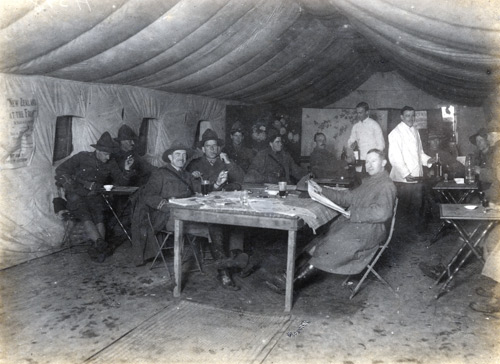Click on the photograph above to see a slide show of images showing New Zealand soldiers going on leave and enjoying moments of recreation and humour behind the lines. The captions are those used in the original scrapbook from which these images are taken.
Rest and recovery
After completing their stint at the front line, units were sent to the rear of the battlefield for rest, recreation and further training. Behind the lines the pattern of daily life was far removed from the hardship and horror of the front line trenches. Troops in reserve were safe from immediate enemy assault or sniper fire although the risk of sudden bombardment and sporadic air attacks remained. Accommodation and other amenities were usually much more comfortable, but there was still hard work. Soldiers spent long days marching and drilling, cleaning their kits, attending lectures and labouring on repairs and improvements to trench networks, camps and roads.
In their spare time, soldiers wrote letters and diaries, drew sketches, read books and magazines, pursued hobbies, played cards or gambled. There were also opportunities for more-organised social activities. Sports events were highly popular and were encouraged by the military authorities as a means of maintaining fitness and camaraderie. Many soldiers competed in boxing tournaments, athletics competitions, and football and cricket matches.
The New Zealanders were naturally keen sportsmen, especially at rugby. Their divisional side performed impressively against British, Australian, South African and French teams and won the 1917 Somme Cup tournament. With such a large proportion of each country's young men in the army, these sides were often close to peacetime test-match strength. Matches between different units and divisional internationals were fiercely contested.
Music and theatre were also popular diversions. Brass and pipe bands, choirs and concert parties toured camps and put on shows for the troops. Other soldiers entertained their mates with impromptu musical, pantomime and comedy performances. Hymn singing was a popular feature of church services.
Camp canteens provided refreshments to the ranks, while officers enjoyed the more sophisticated surroundings of officers' clubs. Those granted longer spells of leave often had the opportunity to travel to nearby towns or cities where a range of entertainments – both respectable and illicit – were on offer.




Community contributions